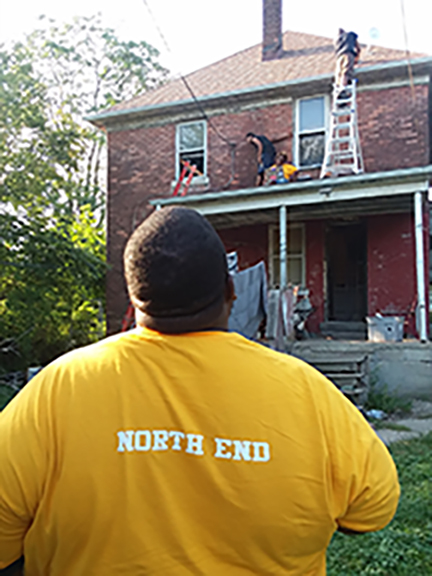Growing Digital Equity: the Origins and Promise of Community Internet in Detroit Communities in Detroit are innovating to address rampant neglect by the broadband industries |
New York, June 25, 2020 --This is not a digitally equitable world. The pandemic has shone a bright spotlight on digital inequity, and many people are just now waking up to the depth of social and economic inequalities which also mean digital exclusion of marginalized communities. Meanwhile, communities in Detroit have been innovating for more than 15 years to address neglect by the broadband industry, creating digital justice by building their own internet. Today, The New School’s Digital Equity Lab is releasing a new in-depth case study, Growing Digital Equity: the Origins and Promise of Community Internet in Detroit, drawing on years of collaborative in-depth research with community technologists and organizers.This case study offers a deep dive into how an ecosystem of community and not-for-profit organizations, developed a model for internet provision that is owned and led by the community and its leaders. It features the work of the Detroit Community Technology Project (DCTP)’s Equitable Internet Initiative, which has spearheaded this effort in partnership with community organizations in three Detroit neighborhoods. The North End Woodward Community Coalition, Grace in Action, and Church of the Messiah -- in the North End, Southwest and Southeast Detroit neighborhoods respectively -- co-developed the model with DCTP and continue to maintain their own infrastructure. The case study focuses on the North End and particularly on the networks -- both human and digital -- that formed to foster digital equity in a place where systemic racism and redlining has resulted in neglect by both the local government and telecommunications companies. The full executive summary is below, and here is a link to download the full report. "We must make digital equity a fundamental part of the conversation we are having in this country about racism and structural inequity, says Maya Wiley, founder and co-director of The Digital Equity Lab. "Our report shows not only how systematic segregation and underinvestment in Detroit’s communities of color have perpetuated a racialized system of digital inequity -- but also how community leaders, adopting a holistic approach, have started to reverse these unjust dynamics. Detroit's example, led by communities of color, shows how to build digital equity sustainably from the ground up." While the Digital Equity Laboratory is sunsetting its work as a university center, it continues to lead digital equity initiatives at The New School, directing critical energy and resources to build directly with community partners like DCTP. This transition is intended to lift up long-term organizing in service of digital equity, and to radically reimage how digital advances might be directed to build more justice and more peace, especially for black and brown communities who have previously experienced neglect or oppression by the telecommunications industry and big technology. Executive SummaryIn a digital age where our lives, politics, and economies are increasingly negotiated online, digital equity is central to fair and inclusive cities. As a baseline, digital equity requires that all members of society have affordable access to reliable, high-speed Internet. But more than that, it requires the ability of communities to understand, know how to use and drive technology and its outcomes to solve local problems and support local innovation.We do not live in a digitally equitable world. Existing social and economic inequalities also mean digital exclusion of marginalized communities. Digital inequities stem from a toxic stew of residential segregation and redlining, as well as outsized power in the telecommunications industry (Mabud and Seitz-Brown 2017). In Detroit, over 40% of the population lack access to home-based Internet and, as a result, have fewer tools to participate fully in our society, democracy, and economy. While cities with more resources than Detroit have approached the problem through public infrastructure investments and public-private partnerships, we argue that deep community engagement and leadership in deploying technology and solving community problems is critical in achieving digital equity. Municipal governments, especially ones with limited public resources, should consider investing in hyper-local, community-scale work that ties together infrastructure, digital literacy, and extensive community engagement.In this case study, we focus on Detroit and the predominantly Black and lower-income neighborhood of the North End as an example of innovative, community-scale projects that are locally generated. In the North End and two other communities, the Detroit Community Technology Project (DCTP) (sponsored by Allied Media Projects), have launched the Equitable Internet Initiative (EII). EII exists in partnership with North End Woodward Community Coalition in the North End and Grace in Action and Church of the Messiah in Southwest and Southeast Detroit respectively. EII has three components: 1) train residents, known as “digital stewards” to build and maintain a gigabit speed wireless network; 2) provide share gigabit speed service to fifty households in each neighborhood, including the North End; and 3) create neighborhood-based Internet service providers (ISPs) that explore alternative sustainable economic models to the private sector. Exclusionary market-driven broadband alternatives are the norm (Mabud and Seitz-Brown 2017), but DCTP’s approach provides an experiment to challenge the for-profit models of expensive service that price communities out, while also providing communities with tools to consider how to make use of the technology. Sustainability of these networks remains a challenge but is a worthy part of the experiment. In the absence of government support and private investment, nonprofits, community services agencies and community-based groups have worked to support meaningful broadband access and digital literacy (Byrum & Gangadharan 2012) |
|
Founded in 1919, The New School was established to advance academic freedom, tolerance, and experimentation. A century later, The New School remains at the forefront of innovation in higher education, inspiring more than 10,000 undergraduate and graduate students to challenge the status quo in design and the social sciences, liberal arts, management, the arts, and media. The university welcomes thousands of adult learners annually for continuing education courses and public programs that encourage open discourse and social engagement. Through our online learning portals, research institutes, and international partnerships, The New School maintains a global presence. |
 |
MARKETING AND COMMUNICATION |
| 79 Fifth Avenue New York, NY 10003 www.newschool.edu |
PRESS RELEASE |
Media Contacts: The New School |
|
|
